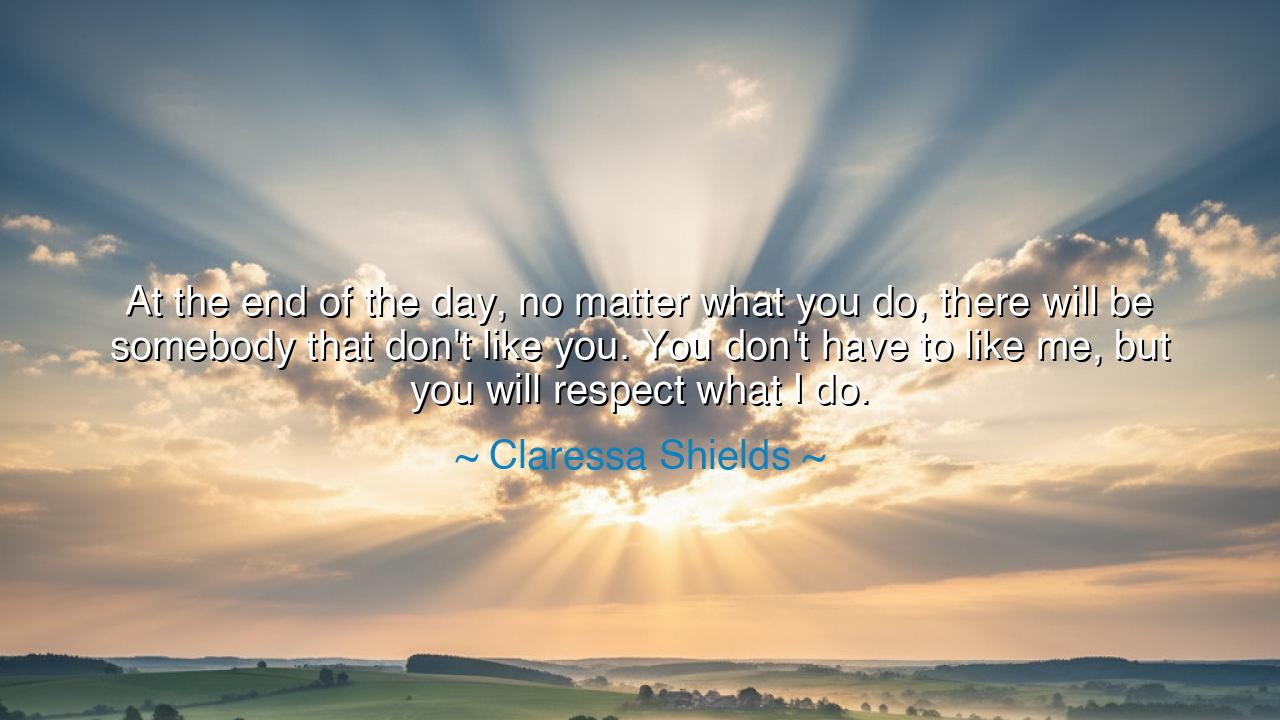
At the end of the day, no matter what you do, there will be
At the end of the day, no matter what you do, there will be somebody that don't like you. You don't have to like me, but you will respect what I do.






In the fierce and defiant words of Claressa Shields, we hear the cry of a warrior who has faced judgment, doubt, and adversity — and risen above them all: “At the end of the day, no matter what you do, there will be somebody that don’t like you. You don’t have to like me, but you will respect what I do.” These words are not born from arrogance, but from the fire of self-knowledge — the wisdom of one who has walked through the storms of criticism and emerged unbroken. Shields, the boxing champion who carved her name into history through sheer power and perseverance, speaks for all who have been misunderstood, underestimated, or denied their worth. Her statement is both a shield and a sword — a declaration that respect, not approval, is the true measure of greatness.
The meaning of this quote lies in its profound understanding of human nature and destiny. To live with purpose is to invite both admiration and resistance. The moment one steps into the arena of greatness, there will always be voices of envy, fear, and misunderstanding. Shields reminds us that universal love is neither possible nor necessary — that seeking everyone’s approval is a chain that binds the soul. What matters is not to be liked, but to be respected, and respect is not granted by flattery or compromise; it is earned through action, discipline, and mastery. Her words teach that the true warrior does not waste breath defending her worth — she lets her deeds speak in the silence between blows.
The origin of these words springs from the life of Shields herself — a story as inspiring as any in the annals of sport. Born in Flint, Michigan, a city scarred by poverty and hardship, she rose from obscurity to become one of the most dominant boxers in the world. She won Olympic gold not once, but twice — the first American boxer, male or female, to achieve that feat. Yet despite her triumphs, she faced scorn, doubt, and even ridicule. Many questioned her confidence, mistaking it for pride; others resented her for daring to stand tall in a world that expects humility from those it once tried to silence. It was in this furnace of misunderstanding that her philosophy was forged: that respect is not asked for — it is commanded by excellence.
In the ancient world, such courage was the mark of the heroes. Achilles, though hated by some and feared by others, fought not to be loved but to uphold his honor. Joan of Arc, burned by those who called her arrogant and delusional, still rides through the corridors of history as a symbol of conviction. The pattern repeats through time — the ones who challenge boundaries are seldom liked, but they are always remembered. Shields, in her way, belongs to that lineage. Like the ancient heroes, she fights not merely for victory, but for identity — for the right to define herself on her own terms. Her words echo through centuries of struggle, reminding us that those who walk in truth must learn to endure misunderstanding.
There is an emotional depth to Shields’ statement that reaches beyond sport. It speaks to every soul who has dared to rise — the artist whose work is mocked, the leader whose courage offends, the woman whose confidence is mistaken for arrogance. To live authentically is to live dangerously, for the world often punishes those who refuse to shrink. Yet, as Shields declares, you need not be loved to stand tall — only respected. Respect is not affection; it is recognition. It is the world’s reluctant bow to the undeniable. The wise do not seek love from all; they seek only to be true to their craft, their purpose, their calling.
Let us consider a story from the life of Galileo Galilei, the great astronomer. When he declared that the earth moved around the sun, the powers of his age despised him, branding him heretic. Yet he did not recant his conviction, for he knew that truth is not determined by majority, nor by approval. Though the world silenced his voice, it could not silence his legacy. Centuries later, even his enemies bowed to his wisdom. This is the power of Shields’ philosophy — that respect endures where affection fades. The one who walks in truth may be hated in their time, but they will be honored in eternity.
The lesson we must take is clear: do not live to please, live to prove. Let your work speak where words cannot. Build such mastery that even your enemies must acknowledge your skill. When others misunderstand your fire, do not dim it to soothe them — let it burn brighter. There is dignity in being disliked for what is true, and disgrace in being loved for what is false. Seek respect, for it comes from achievement, not approval; from consistency, not conformity.
So let the words of Claressa Shields be carried like a battle hymn into the hearts of all who strive: you need not be loved to be worthy — but you must be worthy to be respected. Be fierce in your purpose, steadfast in your craft, and fearless in your truth. Let criticism sharpen you, not wound you. For in the end, the applause of the crowd fades, but the mark of respect, once earned, endures like stone. And those who walk with integrity and strength — like Shields, like the heroes before her — will stand unshaken, long after the noise of the world has passed away.






AAdministratorAdministrator
Welcome, honored guests. Please leave a comment, we will respond soon